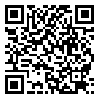

Volume 11, Issue 2 (5-2013)
RBS 2013, 11(2): 0-0 |
Back to browse issues page
Download citation:
BibTeX | RIS | EndNote | Medlars | ProCite | Reference Manager | RefWorks
Send citation to:



BibTeX | RIS | EndNote | Medlars | ProCite | Reference Manager | RefWorks
Send citation to:
فتحي م, سهرابي ف, سعيديان م. Comparison of the characteristics and identity style of Internet addicts and non-addicts students. RBS 2013; 11 (2)
URL: http://rbs.mui.ac.ir/article-1-302-en.html
URL: http://rbs.mui.ac.ir/article-1-302-en.html
1- دانشيار، گروه روانشناسي، دانشكده روانشناسي و علوم تربيتي، دانشگاه علامه طباطبايي، تهران، ايران
2- مربي آموزشي، گروه علوم اجتماعي، دانشگاه پيام نور واحد روانسر، کرمانشاه، ايران
2- مربي آموزشي، گروه علوم اجتماعي، دانشگاه پيام نور واحد روانسر، کرمانشاه، ايران
Abstract: (2239 Views)
Aim and Background: Internet access is a growing phenomenon. With increasing and widespread access to Internet, dependency to Internet is observed among the youth. This research aimed to compare personality characteristics and identity styles in Internet addicted and non-addicted students. Methods and Materials: This was a causal-comparative research carried out in the educational years 2011-2012. The statistical community of the research contained all the dormitory male students resided in Tehran University dormitory (about 6000 students). 380 students were selected via random sampling based on Morgan table. According to the population of each dormitory, related questionnaires were distributed and fulfilled, so that by referring to each one of the student rooms, questionnaires were delivered and collected after about 20 minutes. The study tools included Young`s Internet Addiction Test (IAD), Personality Inventory (NEO), and Berzonsky Identity Styles Inventory (ISI-6). In order to analyze data in two descriptive and analytic levels, statistic t-test was utilized. Findings: Results indicated that in terms of personality characteristics, there is a difference between Internet addicted and non-addicted students, so that neuroticism was in a higher level for Internet addicted students than for non-addicted ones. As well, the three variables of extroversion, agreeableness and conscientiousness were in a higher level for Internet non-addicted students than for addicted ones. There was, however, no difference between the two groups in terms of personality characteristics of openness to experience. There was also a meaningful difference between the two groups in terms of identity variables. Informational style was in a higher level for Internet non-addicted students than for addicted ones. As well, normative style and diffuse-avoidant style was in a higher level for Internet addicted students than for non-addicted ones. Conclusions: There is, in terms of personality characteristics and identity style, a difference between Internet addicted and non-addicted students.
| Rights and permissions | |
 |
This work is licensed under a Creative Commons Attribution-NonCommercial 4.0 International License. |



